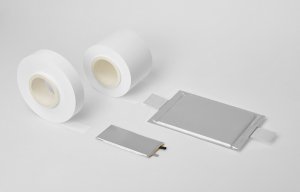
Increased safety for lithium-ion batteries
The safety separator consists of an ultra-thin PET nonwoven, impregnated with ceramic particles.

19th May 2016
Innovation in Textiles
|
Weinheim
For the foreseeable future, the Chinese government will be promoting a number of projects, including those that encourage the expansion of e-mobility in public transport. In this context, ceramic-impregnated high-performance separators for lithium-ion batteries made by Freudenberg Performance Materials can provide important support. Due to their safety performance and high reliability, they can also be adapted for use in stationary energy storage systems, such as solar energy, the manufacturer reports.
“Compared to conventional products, the Freudenberg safety separator offers decisive advantages. It significantly increases safety, is much more temperature-resistant and gives lithium-ion batteries a longer service life,” explained Dr Frank Heislitz, Chief Technology Officer Freudenberg Performance Materials.
The safety separator consists of an ultra-thin PET nonwoven, impregnated with ceramic particles. According to the manufacturer, it remains stable at temperatures of up to several hundred degrees Celsius and does not shrink.
In comparison to conventional products, it is said to be considerably less sensitive to mechanical stress, particularly at high temperatures. Using the safety separator is also said to help to reduce the production cost of lithium-ion batteries. Because higher temperatures can be used, preparation of the battery cells is accelerated by a faster drying process and increased speed of electrolyte impregnation.
From energy density to energy throughput and temperature range, the demands placed on batteries for applications in stationary energy storage systems are very different from those in electric vehicles.
Each battery component must be individually selected for the specific application. However, all applications share one thing in common: the need to offer a high degree of safety and reliability while avoiding harming people and the environment. According to the company, these properties are offered by the Freudenberg separator.
The separator has already been successfully tested in customer-developed high-energy cathode systems, the company reports.
Although these electrode materials promise a higher level of cell energy density and are particularly suitable for use in both cars and buses, they have not yet proved sufficiently reliable and safe. Using the Freudenberg separator aims to significantly reduce these problems.
At CIBF, Freudenberg will also be presenting the company’s separators for nickel batteries. Their advantages are said to include a high uniformity in structure and thickness as well as tight pore radius distribution.
The reliable separation of positive and negative electrodes and the labyrinth structure that acts as an effective barrier to dendrite growth, are further strengths of Freudenberg’s separators for nickel batteries.

Business intelligence for the fibre, textiles and apparel industries: technologies, innovations, markets, investments, trade policy, sourcing, strategy...
Find out more